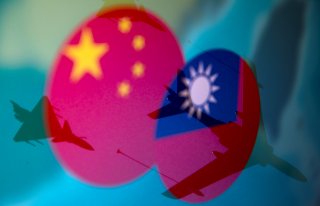Nicaragua Dumps Taiwan, Embraces Beijing
In accordance with the “One China” policy, the Nicaraguan government severed its diplomatic relations with Taiwan after it had formed them with China.
Nicaraguan President Daniel Ortega declared on Thursday that his country would switch its diplomatic ties from Taiwan, where it remained one of a handful of nations that continued to recognize the government in Taipei as the legitimate government of China, to the “People’s Republic of China,” the Communist government that has led the mainland since 1949.
In accordance with the “One China” policy, the Nicaraguan government severed its diplomatic relations with Taiwan after it had formed them with China. A statement released by the government in Managua argued that the PRC “is the only legitimate government that represents all of China,” also claiming that “Taiwan is an inalienable part of the Chinese territory.”
Taiwan quickly took note of the switch; in a carefully worded statement, it expressed its “pain and regret” and claiming that Ortega had ignored the bonds of friendship that had formed between Taiwanese and Nicaraguans during the two countries’ seventy-year relationship. The island’s foreign ministry claimed that it would continue to pursue “pragmatic diplomacy” to achieve its “due international status” in spite of the Nicaraguan split.
Beijing, however, was ecstatic, with Chinese UN ambassador Zhang Jun congratulating Ortega and his government’s “right decision.”
“The One China principle is a consensus widely accepted by the international community,” the ambassador tweeted, “and allows no challenge.”
After Nicaragua’s departure from its camp, Taiwan holds formal diplomatic relations with only fourteen other countries, many of which are small and have limited commercial exchange with either Taiwan or China. The remaining countries are Belize, Guatemala, Haiti, Honduras, Paraguay, Tuvalu, the Marshall Islands, Saint Kitts and Nevis, Saint Vincent and the Grenadines, Saint Lucia, Nauru, Palau, Eswatini (known as Swaziland prior to 2018), and the Vatican.
Although the United States was not mentioned in Nicaragua’s statement announcing the shift, the country’s break with Taiwan is a setback for the United States, indicative of the souring relationship between Managua and Washington. Policymakers in the United States have pursued Ortega and other Nicaraguan officials for human rights violations and anti-democratic policies. President Joe Biden described Ortega’s re-election to a fourth term in November, in which the former Marxist guerrilla ostensibly won more than 75 percent of the vote, as a “pantomime.”
On the same day as the recognition switch, the State Department added economic sanctions against Nestor Moncada Lau, a member of Ortega’s inner circle, accusing him of customs fraud.
Prior to Nicaragua’s departure, Taiwan lost the Solomon Islands and Kiribati in 2019, while the Honduran government threatened to switch earlier this year; it has since walked back the threat, indicating it will preserve relations with Taipei for the time being.
Trevor Filseth is a current and foreign affairs writer for the National Interest.
Image: Reuters

